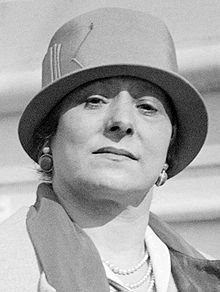Helena Rubenstein
| Helena Rubinstein | |
|---|---|
 |
|
| Born |
Chaja Rubinstein December 25, 1872 Kraków, Poland |
| Died | April 1, 1965 (aged 92) Manhattan, New York City, US |
| Nationality | Polish |
| Other names | Princess Gourielli, Madame Helena Rubinstein, Chaja Rubinstein |
| Citizenship | Australian American |
| Occupation | Businesswoman, philanthropist, art collector |
| Known for | Founder and eponym of Helena Rubinstein Incorporated cosmetics company |
| Spouse(s) | Edward William Titus (1908-1938; divorced; 2 children) Prince Artchil Gourielli-Tchkonia (1938-1956; his death) |
Helena Rubinstein (born Chaja Rubinstein, December 25, 1872 – April 1, 1965) was a Polish American businesswoman, art collector, and philanthropist. A cosmetics entrepreneur, she was the founder and eponym of Helena Rubinstein Incorporated cosmetics company, which made her one of the world's richest women.
Rubinstein was the eldest of eight daughters born to a Polish-Jewish couple, Augusta - Gitte (Gitel) Shaindel Rubinstein née Silberfeld and Horace - Naftoli Hertz Rubinstein; who was a shopkeeper in the city of Kraków in Lesser Poland, which became part of Austria-Hungary following the partitions of Poland in the late 18th century. The existentialist philosopher Martin Buber was her cousin. She was also the cousin of Ruth Rappaport's mother.
Diminutive at 4 ft. 10 in. (147 cm), Rubinstein emigrated from Poland to Australia in 1902, with no money and little English. Her stylish clothes and milky complexion did not pass unnoticed among the town's ladies, however, and she soon found enthusiastic buyers for the jars of beauty cream in her luggage. She spotted a market where she began to make her own. Fortunately for Rubinstein, a key ingredient of the cream, lanolin, was readily at hand.
Coleraine, in the Western Victoria region, where her uncle was a shopkeeper, might have been an "awful place" but was home to some 75 million sheep that secreted abundant quantities of wool grease or wool wax, chemically known as lanolin. These sheep were the wealth of the nation and the Western District's vast mobs of merinos produced the finest wool in the land. To disguise the lanolin's pungent odour, Rubinstein experimented with lavender, pine bark and water lilies.
Rubinstein had a falling out with her uncle, but after a stint as a bush governess began waitressing at the Winter Garden tearooms in Melbourne. There, she found an admirer willing to stump up the funds to launch her Crème Valaze, supposedly including herbs imported "from the Carpathian Mountains". Costing ten pence and selling for six shillings, it walked off the shelves as fast as she could pack it in pots. Known to her customers only as Helena, Rubinstein could soon afford to open a salon in fashionable Collins Street, selling glamour as a science to clients whose skin was "diagnosed" and a suitable treatment "prescribed".
...
Wikipedia
